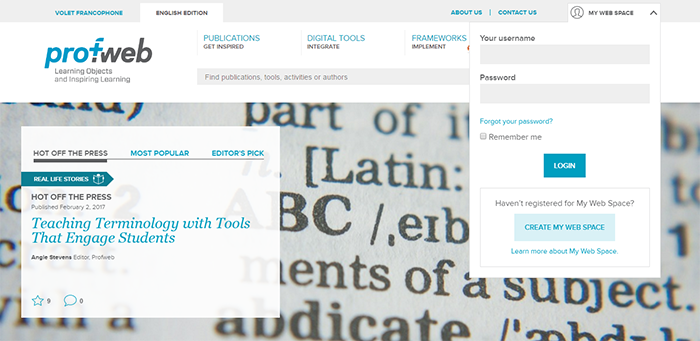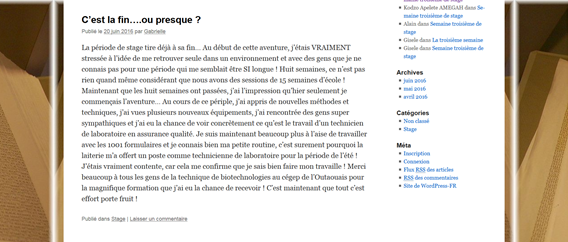The Blog as a Monitoring Tool for Internships in Biotechnology
Supervising students well in class is one thing, but when it comes to doing so with respect to internships, it becomes much more complex. How do you follow their evolution and give value to everything they will have accomplished? By putting a blog into place, through the My Web Space hosted by Profweb, I was able to achieve several of my pedagogical objectives. I will share with you my first experience with my students in biotechnology.
In my course, Integrative Project (210-6B1-HU) in the 6th semester of the program Laboratory Technology (specialization in biotechnology), the students have to conduct a second and final internship from mid-April to mid-June, so as to apply the diverse concepts seen during their studies. It is in some ways the final big step before their graduation.
For the past 3 years, I have been responsible for this course, and it’s the first year that I have tested the use of the blog for monitoring the progress of the work of the students during their internship. Before, I asked them to keep a paper “logbook” that they had to write in regularly. I would then consult this long document. The students unfortunately received my feedback and encouragement with a certain time gap.

The homepage of the blog Journal Biotech by Alain Toutloff.
In 2015, I decided to participate in a course offered by PERFORMA (a course entitled: Le Web 2.0 et son potentiel pédagogique), telling myself that this would certainly be useful in this context. I became aware of numerous pedagogical possibilities offered by this type of digital tool and I decided to put it into practice in my course the following semester.
In 2016, I decided to take the “big leap” and to make a virtual space accessible to my students, which they would use on a weekly basis, to present completed assignments, their impressions, sometimes even their frustrations with the objective of allowing me to follow their progress in a more regular way and to favour interactions between themselves.
I had read several real life stories and articles on Profweb that dealt with My Web Space available for teachers and that had aroused my curiosity. After a simple, fast and free sign up process, I created my WordPress account via the Profweb site. The setting up of this type of site is rather intuitive and easy to use. Through trial and error I managed to integrate all the necessary content of my course into the blog. I also benefited from the precious help and technical support offered by Profweb. My blog was ready and functional soon after my registration!

This is where you can sign up on the Profweb site.
To help you in the process of signing up and creating your Web Space, Guillaume Vachon, web designer for Profweb, created a short, yet complete tutorial.
My Preoccupations
I decided to choose a blog for a variety of reasons:
- I wanted to centralize all of the students’ activities during their internship, while emphasizing the work being done by them.
- I also wished to find a way to give them feedback gradually during the course of their internship and allow them to demonstrate their experience.
By making the blog public, I told myself that it would increase the quality of the final logbook. I also had in mind to prove to them that what they doing during their internship is important, not only for them and for the course, but also for the entire community that surrounds them. As their internship is conducted with several different employers (private businesses, schools, federal ministries, municipalities, etc.), the contribution from their internship is important for the society in general, and not just their academic institution. One important objective behind all of this was, of course, to reinforce the intrinsic motivation of the students and to develop their professionalism.
My Pedagogical Approach and Strategic Choices
I presented the site to my students just before the beginning of their internship. I explained to them why I had chosen this tool (blog) and the approach (logbook) for monitoring.
During their internship, for 8 weeks, the students have to carry out a minimum of 8 interventions on the blog. The entries must be in direct link with their work, give details about the progress of their internship as well as the tasks realized. The students must also interact with the other articles of the blog and bring up particular points with respect to the work of their colleagues. The number of articles written is evaluated as well as the comments made about their peers.
This virtual “logbook” allows for the development of collaboration and sharing of expertise between the students during their training. It also allows them to acquire a critical mind while integrating notions seen in the program.
Moreover, I wanted the blog to be public to allow teachers of the department and the external community to interact and comment. My colleagues accepted without hesitation! This enriched the experience of the students. I think that it is a good source of motivation and recognition for these young people about to join the job market!
When the internship is finished, the students must return to class to go over their experience. The first 4 days are done with entire group. The last day, they are invited to orally present the fruits of their work, in front a real audience. It is a major event for them that takes place in a local microbrewery, in front of colleagues, parents, and friends who come to support them. It is a very friendly atmosphere that allows students to be more relaxed. This event is very motivating for them because it proves that their work can be of interest to other people than their teacher!

A screenshot of Alain’s blog, which allows him to communicate with students during their internship.
My Observations
This blog achieved many of my pedagogical objectives and my students greatly appreciated the experience. I see the step of preparing the blog for use as time well invested. The blog allowed me to provide feedback during the internship that was rapid, while following the progress of the interns through their publications.
In view of the public nature of the tool, I could remark that the quality of the work submitted by the students was superior. In addition, I noticed a higher level of commitment on their part during the internship.
Testimony from Students Having Used the Blog
I gathered the impressions of the students having tested the blog for the first time. Here are some of their reactions, taken from when they told me what were the advantages of using a blog as a logbook for an internship:
In Conclusion
My assessment is positive! I will continue to use the blog for internships as a monitoring tool. I want to improve the visual presentation of the blog making it more friendly and welcoming.
The creation of a wiki interests a lot me as well for other courses that I teach. I really have the desire to go further with this type of tool.
If you also use a blog or other devices for monitoring internships, I would be curious to read about your experiences!

